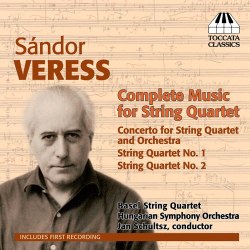|

Support us financially by purchasing
this disc through MusicWeb
for £10.50 postage paid world-wide.

|
Sándor VERESS (1907-1999)
Complete Music for String Quartet
String Quartet No.1 (1931) [17:25]
String Quartet No.2 (1937) [29:07]
Concerto for String Quartet and Orchestra (1961) [24:50]
Basel String Quartet
Hungarian Symphony Orchestra/Jan Schultsz
rec. October 2012, SRF Studio Zurich Brunnenhof (Quartets) and January 2013, Tom-Tom Studio D, Jenö Hubay School of Music, Budapest (Concerto)
TOCCATA CLASSICS TOCC0062 [71:33]
The Hungarian composer Sándor Veress studied in Budapest with Kodály and Bartók and was also one of the latter’s assistants on Bartók’s ethnological field trips to collect examples of folk-music. The 1930s brought him some prominence, gained through performances at ISCM Festivals and elsewhere. It was also the decade in which he wrote his two numbered string quartets.
The First Quartet dates from 1931 but wasn’t published until 1953. It’s a strongly argued and technically accomplished work for a 23-year old composer. The opening is arresting and the music moves between rather withdrawn introspection and a sweepingly taut, drivingly fast section, reminiscent of Bartók’s own Third Quartet. Sonorities in the central movement are inclined to be austere, even chilly - watchful and reflective, certainly. These suggest rather an Olympian view but this is swept aside in the finale in which there is some deliciously evocative folk fiddling to be heard, assuredly redolent of his earlier musicological trips. Veress was firmly committed to native folk traditions and nowhere more explicitly so than in this movement. The village band drones offer fiery dynamism.
The Second Quartet was written between 1936 and early 1937. It was with this work that he felt he had finally achieved a truly personal stamp. Perhaps this is to do with the sense of integration and narrative that he achieves here. The music opens briskly and with an almost impatient sense of direction, the melodies mosaic-like in their placement; firefly incident and a true sense of colour is duly generated. The slow movement is strongly melancholic, veiled in expressive, quiet gestures, occasionally nightmarish and desolate in feeling. The finale’s dramatic dance or March themes offer powerful dissonances, twisting and curling, as the music dissolves briefly before reassembling for the dynamic close. This is a powerful work, a more complete achievement than the earlier quartet, being more balanced and also more edgy.
Veress returned to the string quartet many years later in 1961 in his Concerto for String Quartet and Orchestra. Formed like a Concerto Grosso, its imposing subdivisions may evoke Schoenberg’s much earlier Concerto after Handel, but they surely enshrine far more Veress’ own affiliations with string patterning, and with the play of quartet and orchestra of double woodwind, two horns, two trumpets, trombone, strings, timpani, harp, piano, celesta, xylophone, and unpitched percussion. Much here is fascinating in terms of sonority, whether it’s the independence of the percussion part, the razory intensity of the quartet, the free lyricism of the slow movement, the occasionally gossamer textures in the finale, or the folklorically inflected elements toward the work’s end.
The performances from the Basel String Quartet and from the Hungarian Symphony under Jan Schultsz are exceptionally committed, though pride of place goes to the quartet. Veress left Hungary in 1949 and spent the rest of his long life in Switzerland as a teacher: Heinz Holliger is a prominent student. Due to these difficulties his music has not been accorded as many performances as its fastidious craft deserves. Releases like this, one hopes, may help somewhat.
Jonathan Woolf
|



 All Nimbus reviews
All Nimbus reviews








